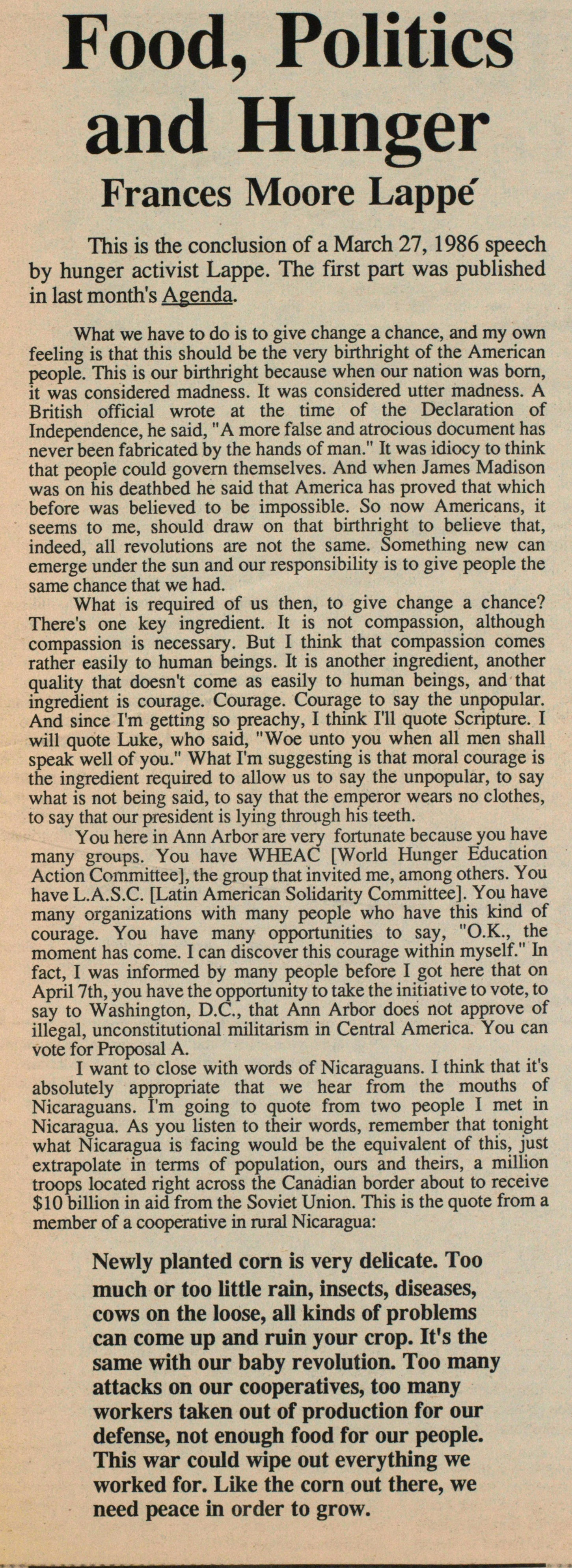Food, Politics And Hunger

This is the conclusion of a March 27, 1986 speech by hunger activist Lappe. The first part was published in last month's Agenda.
What we have to do is to give change a chance, and my own feeling is that this should be the very birthright of the American people. This is our birthright because when our nation was born, it was considered madness. It was considered utter madness. A British official wrote at the time of the Declaration of Independence, he said, "A more false and atrocious document has never been fabricated by the hands of man." It was idiocy to think that people could govern themselves. And when James Madison was on his deathbed he said that America has proved that which before was believed to be impossible. So now Americans, it seems to me, should draw on that birthright to believe that, indeed, all revolutions are not the same. Something new can emerge under the sun and our responsibility is to give people the same chance that we had.
What is required of us then, to give change a chance? There's one key ingredient. It is not compassion, although compassion is necessary. But I think that compassion comes rather easily to human beings. It is another ingredient, another quality that doesn't come as easily to human beings, and that ingredient is courage. Courage. Courage to say the unpopular. And since I'm getting so preachy, I think I'll quote Scripture. I will quote Luke, who said, "Woe unto you when all men shall speak well of you." What I'm suggesting is that moral courage is the ingredient required to allow us to say the unpopular, to say what is not being said, to say that the emperor wears no clothes, to say that our president is lying through his teeth.
You here in Ann Arbor are very fortunate because you have many groups. You have WHEAC [World Hunger Education Action Committee], the group that invited me, among others. You have L. A.S.C. [Latin American Solidarity Committee]. You have many organizations with many people who have this kind of courage. You have many opportunities to say, "O.K., the moment has come. I can discover this courage within myself." In fact, I was informed by many people before I got here that on April 7th, you have the opportunity to take the initiative to vote, to say to Washington, D.C., that Ann Arbor does not approve of illegal, unconstitutional militarism in Central America. You can vote for Proposal A.
I want to close with words of Nicaraguans. I think that it's absolutely appropriate that we hear from the mouths of Nicaraguans. I'm going to quote from two people I met in Nicaragua. As you listen to their words, remember that tonight what Nicaragua is facing would be the equivalent of this, just extrapolate in terms of population, ours and theirs, a million troops located right across the Canadian border about to receive $10 billion in aid from the Soviet Union. This is the quote from a member of a cooperative in rural Nicaragua:
Newly planted corn is very delicate. Too much or too little rain, insects, diseases, cows on the loose, all kinds of problems can come up and ruin your crop. It's the same with our baby revolution. Too many attacks on our cooperatives, too many workers taken out of production for our defense, not enough food for our people. This war could wipe out everything we worked for. Like the corn out there, we need peace in order to grow.